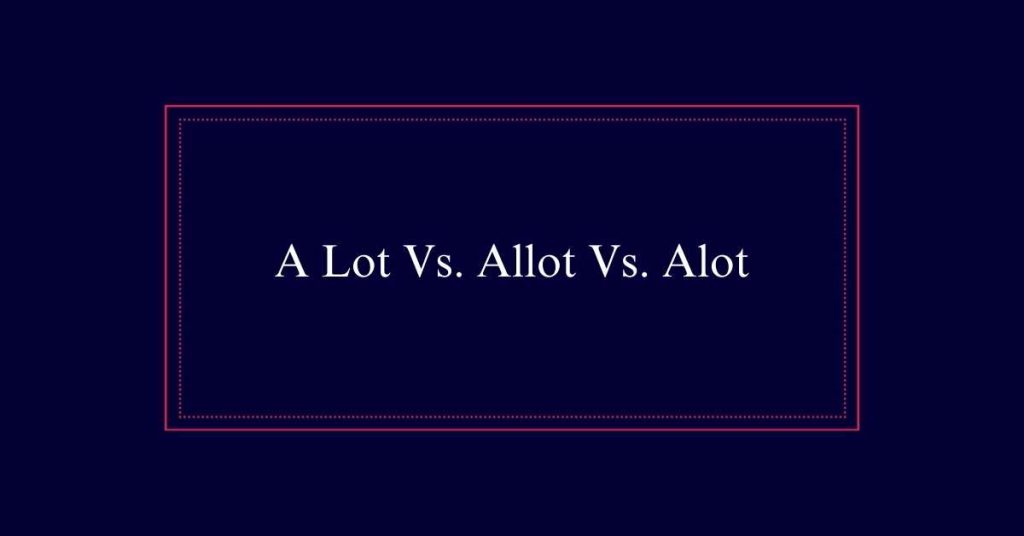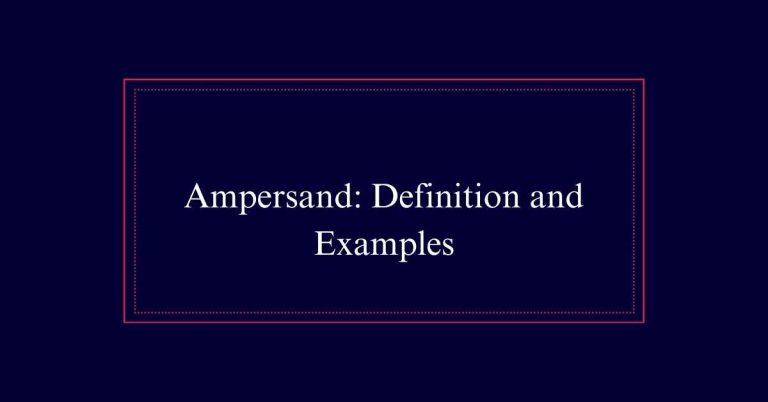A Lot Vs. Allot Vs. Alot
‘A lot’ signifies a large quantity or amount of something, without specifying an exact number. For example, ‘He has a lot of books’. Allot’ means to distribute or assign resources or tasks. For instance, ‘She will allot time for each project’. ‘Alot’ is a common misspelling and is incorrect; always write ‘a lot’ instead.
Definition of “A Lot”
The term ‘a lot’ denotes a large quantity or very much of something. It is commonly used to describe an abundance or significant amount. For example, one might say, ‘I have a lot of work to do,’ indicating a substantial workload. This term helps to visualize the extent of quantity without specifying an exact number.
It is versatile and can be applied in various contexts, such as ‘a lot of apples’ or ‘a lot of people.’ Despite its frequent use, it is important to note that ‘a lot’ is often misspelled as ‘alot,’ which is incorrect.
Examples of “A Lot”
To illustrate the usage of ‘a lot,’ consider these practical examples. It is often used to signify a large quantity or extent in everyday situations. Here are some contexts where ‘a lot’ is appropriately applied:
| Example Sentence | Explanation |
|---|---|
| ‘She has a lot of books in her library.’ | Indicates a large number of books. |
| ‘There is a lot of traffic this morning.’ | Describes a heavy traffic situation. |
| ‘He spends a lot of time on his hobbies.’ | Signifies a significant amount of time spent. |
Visualizing Quantity
When visualizing quantity, ‘a lot’ often conjures images of abundance and significant amounts. It signifies a large, though unspecified, number of items or extent of something. For example, one might think of a grocery basket filled with 10 or 20 apples.
This term is versatile, used to describe extensive work, numerous tasks, or ample resources. The phrase ‘a lot’ emphasizes the magnitude without giving an exact figure. It helps to communicate that something is plentiful, whether concerning time, effort, or physical objects.

Definition of “Allot”
Shifting from visualizing quantity to assigning resources, ‘allot’ refers to the act of distributing or apportioning something for a specific purpose. This verb involves the careful assignment of resources, time, or tasks to meet particular needs or goals.
When you allot, you are designating items or responsibilities to individuals or projects in a structured manner.
Key aspects of ‘allot’ include:
- Distributing resources for specific objectives.
- Assigning time to various tasks or activities.
- Designating funds for particular projects or expenses.
- Apportioning responsibilities among team members.
- Setting aside portions for specific uses.
Examples of “Allot”
Examples of ‘allot’ demonstrate how resources or time can be distributed effectively for specific purposes.
For instance, in a conference, each speaker might be allotted 15 minutes to present their project summaries.
Similarly, a family might allot a certain amount of funds for home renovation.
In business, a startup could decide to allot half of its marketing budget to podcast advertising.
Another example includes setting aside shares within a company for specific purposes.
Additionally, educators might allot specific times during the school day for various subjects.
Common Misuse: “Alot”
One common mistake in English writing is the use of ‘alot,’ which is a misspelling of ‘a lot.’ This error frequently appears in both informal and professional writing. It is important to remember that ‘alot’ is not a word and should be avoided.
Here are some key points to remember:
- ‘A lot’ is always two words, signifying a large quantity.
- ‘A lot’ can be used in various contexts to denote abundance.
- Using ‘alot’ can undermine the credibility of your writing.
- ‘Alot’ should be corrected to ‘a lot’ to maintain proper grammar.
- Remembering this rule can improve the clarity and professionalism of your writing.
A Lot” Vs. “Allot
Understanding the distinction between ‘a lot’ and ‘allot’ is essential for effective communication. ‘A lot’ refers to a large quantity or amount, such as in the sentence, ‘She has a lot of books.’ It signifies abundance without specifying an exact number.
On the other hand, ‘allot’ is a verb that means to distribute or assign resources, tasks, or time. For instance, ‘The manager will allot tasks to each team member.’ Despite their similar pronunciations, they serve different grammatical functions and meanings.
Using ‘a lot’ emphasizes quantity, while ‘allot’ focuses on distribution. Recognizing these differences guarantees clarity in writing and speaking.
Different Parts of Speech
Recognizing the differences in parts of speech helps clarify the distinct roles of ‘a lot’ and ‘allot.
‘A lot’ functions as a pronoun or adverb, indicating a large quantity. It is commonly used in everyday language to express abundance.
On the other hand, ‘allot’ is a verb. It means to distribute or assign resources or tasks.
Key distinctions include:
- ‘A lot’ signifies quantity, often in informal contexts.
- ‘Allot’ designates the action of assigning or distributing.
- ‘A lot’ can be replaced by synonyms like ‘many’ or ‘much.’
- ‘Allot’ often appears in formal or procedural contexts.
- ‘A lot’ and ‘allot’ are not interchangeable despite similar pronunciations.
Usage Scenarios for “A Lot”
‘A lot’ is commonly used to express a large quantity or degree in various contexts. For instance, one might say, ‘I have a lot of work to do today,’ indicating a significant workload. It can describe both countable and uncountable nouns, such as ‘a lot of apples’ or ‘a lot of water.’
It is also used to emphasize intensity, like ‘I enjoyed the movie a lot.’ In conversational language, ‘a lot’ helps convey abundance or extent without specifying an exact number. This term is versatile and widely understood, making it useful in both formal and informal settings.
Usage Scenarios for “Allot”
While ‘a lot’ expresses quantity, ‘allot’ is used to describe the act of assigning or distributing resources or tasks. This verb is often utilized in both professional and personal contexts.
Common scenarios for its usage include:
- Project Management: Assigning specific tasks to team members.
- Budgeting: Distributing funds to various departments or activities.
- Time Management: Allocating time slots for different activities or meetings.
- Resource Distribution: Assigning materials or equipment to projects.
- Event Planning: Setting aside specific times or resources for different parts of an event.
Using ‘allot’ correctly helps in clarity in communication, particularly in structured environments where precise distribution of resources or tasks is essential.
Frequently Asked Questions
How Do You Pronounce ‘A Lot’ and ‘Allot’?
‘A lot’ is pronounced as /ə lɒt/, with emphasis on the second syllable. ‘Allot’ is pronounced as /əˈlɒt/, with stress on the first syllable. Both words have different meanings and usages.
Can ‘A Lot’ Be Used in Formal Writing?
Yes, ‘a lot’ can be used in formal writing, but it is often better to use more precise terms such as ‘many,’ ‘numerous,’ or ‘a significant amount’ to convey the same idea with greater clarity and professionalism.
What Are Common Synonyms for ‘A Lot’?
Common synonyms for ‘a lot’ include ‘many,’ ‘numerous,’ ‘plenty,’ ‘a great deal,’ ‘a large number,’ ‘a significant amount,’ and ‘abundant.’ These terms effectively convey the idea of a substantial quantity or extent.
Is ‘Allotment’ Related to the Verb ‘Allot’?
Yes, ‘allotment’ is related to the verb ‘allot.’ ‘Allotment’ refers to the portion or share assigned as a result of the action to ‘allot,’ which means to distribute or allocate resources or tasks systematically.
How to Avoid Confusing ‘A Lot’ With ‘Allot’?
To avoid confusing ‘a lot’ with ‘allot,’ remember that ‘a lot’ refers to quantity, while ‘allot’ means to distribute or assign. Use ‘a lot’ for abundance and ‘allot’ when apportioning resources or tasks.







